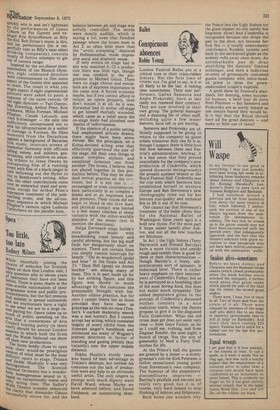Opera
Too little, too late
Rodney Milnes While cheerfully joining the Chorus of welcome for Scottish Opera on their first London visit, I °lily question why in eleven years operation they have not, been before. There is some charm in the olde-worlde nationalism of their Programme notes and public pronouncements, but the fact remains that subsidy is spread nationwide and we southerners have a right to see what we are to a large extent paying for. Opera takes up so trincb of public spending on the arts that a cornerstone of Arts Council touring policy (is there one?) should be annual London seasons in which both the Scots and the Welsh National can show off their new productions. The Scots boldly chose to open with their would-be prestigious version of what must be the most difficult opera to stage, Tristan un.d Isolde. Musically it was very distinguished. The Scottish Orchestra has a wonder
i' homogeneous sound to it, ,sed on exceptionally warm and string tone. The Sadler's ,`",ells Theatre acoustic enhanced Idle clarity that Alexander Gibson successfully strove for, and the balance between pit and stage was artfully controlled. The words were mostly audible, which is saying a lot; even that fiendish passage where the lovers meet in Act 2, so often little more than the "erotic screaming" deplored by Hofmannsthal, made impressive aural and dramatic sense.
If only events on stage had in any way matched it. Of a production there was little sign, though one was credited in the programme to Michael Geliot. There were no stage chorus and extras: both are of supreme importance in the outer acts. A forced economy maybe, but if you cannot afford to mount an opera properly, then don't mount it at all. As it was, Kurwenal had to potter off-stage to get himself mortally wounded, which came as a relief since the on-stage duels had plumbed new depths of ludicrousness.
If the absence of a public setting had emphasised private drama, there might have been some excuse, But the principals, on a Koltai-devised acting area that effectively quartered the size of the stage, did their own things in almost complete stylistic and emotional isolation one from another. The lovers, I believe, had not played together in this production before. This may be standard revival practice on the continent, but it is not one ti encouraged or even countenancec here, particularly in so complex a drama and at an important London premiere. Their voices did not begin to blend in the love duet, and physical contact was limited to a few messy clinches at sharp variance with the other-worldly abandon of the music (not to mention the directions). Helga Dernesch sings Isolde's more gentle music with breathtaking tonal beauty and careful phrasing, but the big stuff finds her dangerously short on stamina. There are certain lines you simply cannot interrupt for breath: "Die so wundervoll (gulp) and leise " in the finale and Act 2's " Dass Hell (gasp) sie dorten leuchte ".. are among many of them. This is in part made up for by her striking figure, and this figure was shown to much advantage by the costumes she presumably brought with her. Another odious practice, but for once I cannot blame her as those provided may have been as graceless as the rest on view (Tristan's V-necked maternity smock was a real horror). But I cannot accept her acting, which consisted largely of every clich4 from the itinerant singer's handbook and jettisoned too many of Wagner's pointed directions in favour of standing and gazing prettily (but vacantly) into the upper middle distance.
Pekka Nuotio's sturdy tenor was heard td best advantage in
Tristan's delirium, but neither his costumes nor the lack of production were any help to an obviously useful artist. The only singers to emerge with much dignity were David Ward, whose Marke we have admired before, and David Fieldsend, an outstanding shepherd.


































 Previous page
Previous page